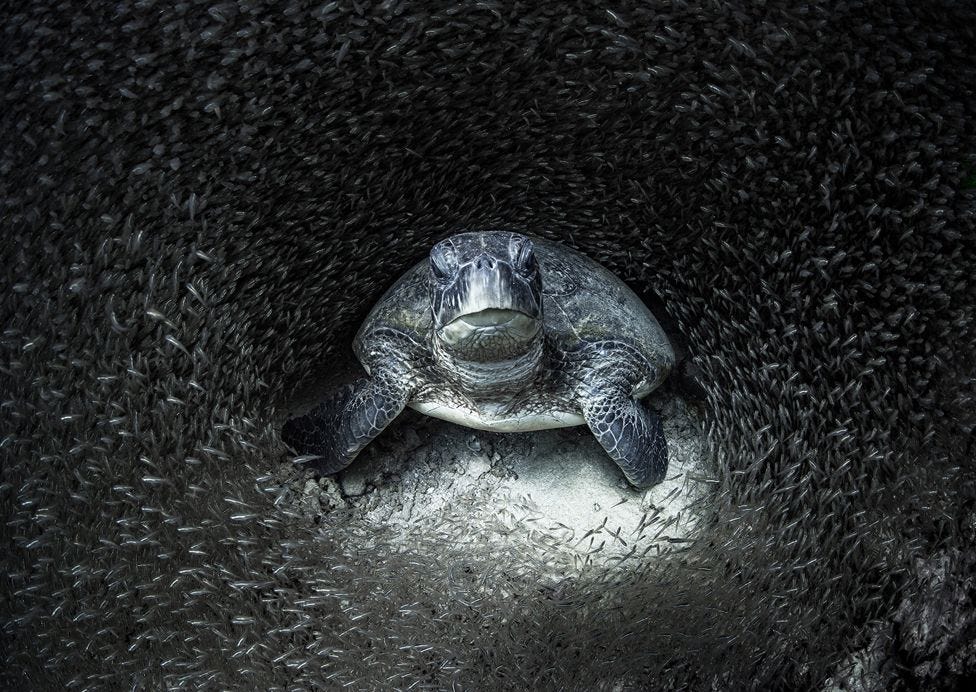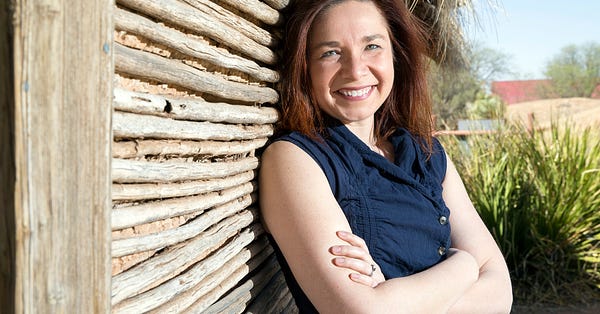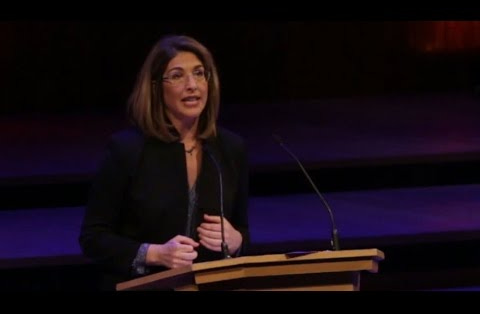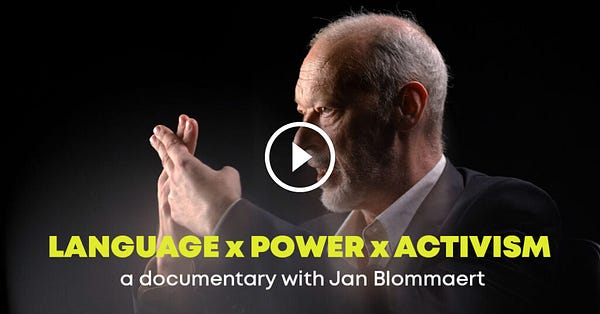🌿Wild Ones #55: 2021 in Review
A recap of 2021 with some of the memorable keywords, tools, research, ideas, tweets, and quotes in ecolinguistics and environmental communication I explored this year in Wild Ones!

Happy New Year everyone! Welcome back to Wild Ones, a weekly-ish digest by me, Gavin Lamb, about news, ideas, research, and tips in environmental communication. If you’re new, welcome! You can read more about why I started Wild Ones here. Sign up here to get these digests in your inbox:
It’s that time of year again when many of us try to recap what just happened over the last 12 months. Last year around this time I wrote a “Wild Ones: 2020 in Review,” so I thought I’d try that again for 2021. Below you can find some of the keywords, tools, research, ideas, tweets, and quotes in ecolinguistics and environmental communication I shared over the past year.
The past year (well, couple of years actually) has been a challenging and crazy time for many of us, to say the least. But I’ve really enjoyed making this digest as it has become a nice source of learning and even fun in my life! So I really appreciate your interest in Wild Ones and I hope you’ll join me for another trip around the sun in 2022! 🌎☀️
🌲10 Environmental Keywords
🔭 10 Environmental Communication Tools
Disinformation Techniques: A Glossary. An excellent guide and teaching resource covering disinformation techniques on everything “from war to cigarettes, guns to GMOs to global warming.” Created by investigative climate journalist Amy Westervelt at Rigged.
‘Complicating the Anthropocene.’ A useful collection of essays and articles crowd-sourced by Min Hyoung Song, a professor of English at Boston College.
How does the language we use affect our treatment of the planet? An interview with Arran Stibbe hosted by the Global Landscapes Forum.
Positive Communication Toolkit: A Guide to Reframing Conservation Messages to Empower Action (pdf).
Attaining Meaningful Outcomes from Conversations on Climate, from the Yale Program on Climate Change Communication
Ed Yong’s writing advice to new science writers and journalists. I also wrote a bit more about drawing on Ed Yong’s advice in my own ecowriting. You can read it here.
Why are there so few people in pictures of climate change? On the visuals of the crisis, representation and immediacy. An intro and selection of resources to improving climate change visuals.
Re:Imagining Change: How to Use Story-Based Strategy to Win Campaigns, Build Movements, and Change the World by Patrick Reinsborough and Doyle Canning (2017). The book comes out of The Center for Story-Based Strategy, a great resource for environmental communicators to check out. They also have a neat collection of ‘tools and resources’ on their website too.
Free tips and resources for teaching nature journaling. A great set of resources for educators teaching all ages on how to incorporate nature journaling into their curriculum.
On Environmental Communication by George Lakoff in the HuffPost. This is a blog post from 2010 but thought it had some interesting tips from the famous linguist.
🗞️10 Environmental Conversations, Films, Podcasts, and Creative Projects
Beings Seen and Unseen: An interview with Amitav Ghosh. Interviewed by Emmanuel Vaughan-Lee in Emergence Magazine (Nov 30, 2021): “Wisdom exists in the context of stories, in the context of storytelling, in the context of songs. And all of that is what we’ve lost and what we have to try and bring back.” – Amitav Ghosh
The Fisherman's Son: The Spirit of Ramon Navarro. “Born and raised at Punta de Lobos, Ramón Navarro found his passion riding the biggest waves on the planet. But his accomplishments in giant surf are just one part of a bigger vision to protect the culture and environment of the Chilean coast.”
Robert Macfarlane: The Worlds Beneath Our Feet. An Interview with Krista Tippett, On Being.
To Speak of the Sea in Irish: A new dictionary project aims to safeguard coastal Irish words and the unique perspectives they provide.
Invisible Hand: Rights of Nature Documentary (trailer), a documentary about the rights of nature concept.
OVERHEATED: An interview with Kate Aronoff, climate journalist at The New Republic, On A World to Win with Grace Blakeley.
Sanctuaries of Silence: An immersive listening journey: “Silence just might be on the verge of extinction, and acoustic ecologist Gordon Hempton believes that even the most remote corners of the globe are impacted by noise pollution.”
Climate Guilt, Brought to You by Big Oil: “A new study from Harvard science historians Naomi Oreskes and Geoffrey Supran points to the use of language targeted specifically to downplay the reality of climate change and shift responsibility entirely onto consumers. Geoffrey Supran, the lead author on the study, joins to discuss.”
Finding the Mother Tree: An Interview with Suzanne Simard. Interviewed by Emmanuel Vaughan-Lee in Emergence Magazine: “I’m standing on the shoulders of thousands of years of knowledge. I think it’s so important that we all recognize this. There is so much knowledge there that we’ve ignored.” – Suzanne Simard
The Serviceberry: An Economy of Abundance an essay by Robin Wall Kimmerer and narrated by her.
📚 10 Research Articles/Books/Talks
Place-based Climate Change Communication and Engagement in Canada’s Provincial North: Lessons Learned from Climate Champions. By Maya K. Gislason, Lindsay Galway, Chris Buse, Margot Parkes, and Emily Rees in Environmental Communication.
From Publications to Public Actions: The Role of Universities in Facilitating Academic Advocacy and Activism in the Climate and Ecological Emergency. By Charlie J. Gardner, Aaron Thierry, William Rowlandson and Julia K. Steinberger in Frontiers in Communication: “…universities must reconsider their role in society and adapt their operational models to explicitly recognise engagement in policy and political processes as part of the work mandate of their staff, and adopt mechanisms to facilitate and reward it.”
Climate Justice Literacy: Stories‐We‐Live‐By, Ecolinguistics, and Classroom Practice. By James S. Damico, Mark Baildon, Alexandra Panos in The Journal of Adolescent and Adult Literacy.
Language, Coffee, and Migration on an Andean-Amazonian Frontier: “The book brings together a fine-grained analysis of multilingualism with urgent issues in Latin America today, including land rights, poverty, drug trafficking, and the devastation of the world’s largest forest. It offers a timely on-the-ground perspective on the agricultural colonization of the Amazon, which has triggered an environmental emergency threatening the future of the planet.”
Shimmer: Flying Fox Exuberance in Worlds of Peril, by Deborah Bird Rose, University of Edinburgh Press (coming February 2022): “Deborah Bird Rose explores the shimmer of life – the iridescent pulse of beauty and power, the processes of transition and transformation – that flows across and between generations. Grounded within this insight, she develops and advocates for an ethics of attention, that is in the world within everyday practices, and in this case for and with flying foxes and their worlds. A deeply personal book, her struggle with cancer is gently woven into the account she offers of flying fox life and death.”
Ecomedia Literacy: Integrating Ecology into Media Education, by Antonio López: “For now, we still live in a world in which one who cares about environmental issues is considered an ‘environmentalist’ as opposed to a regular being.”
Commentary: Underestimating the Challenges of Avoiding a Ghastly Future. In January, a ‘perspective article’ was published in the journal Frontiers in Conservation Science.
Bathsheba Demuth: "The Reindeer at the End of the World: Apocalypse, Climate, and Soviet Dreams": “Bathsheba Demuth, Assistant Professor of History and Environment and Society at Brown University, is an environmental historian, specializing in the lands and seas of the Russian and North American Arctic. She is interested in how the histories of people, ideas, places, and non-human species intersect.”
Storytelling and Ecology: Empathy, Enchantment and Emergence in the Use of Oral Narratives, by Anthony Nanson: “Linking the ongoing ecological crisis with contemporary conditions of alienation and disenchantment in modern society, this book investigates the capacity of oral storytelling to reconnect people to the natural world and enchant and renew their experience of nature, place and their own existence in the world.”
The Power of Narrative: Climate Skepticism and the Deconstruction of Science. By Raul P. Lejano and Shondel J. Nero. Oxford University Press: “Narrative is the stuff of community. The Power of Narrative embarks on a quest to understand how narrative works in taking an inchoate group of individuals and turning it into a powerful social movement.”
💡 10 Ideas
A resolution for 2021: Be a better ancestor. By Kate Yoder in Grist
How we talk about the climate crisis is increasingly crucial to tackling it, by Susanna Rustin, in The Guardian: “Our emotional register – how ‘doomy’ or ‘hopeful’ we are – will inevitably shape the policies we put forward”
Thank you, Barry Lopez. An obituary and selection of the environmental writers’ essays published in Orion Magazine, by the Orion Staff.
Dissecting stories about garbage in popular culture. Why they matter. By Mehita Iqani, Professor in Media Studies, University of the Witwatersrand. in The Conversation.
Geo Takach on the role of art and humor in environmental communication: “Rational appeals to science are failing us when it comes to environmental protection. So how can we motivate people to act? Laughter, arts-based methods and appeals to emotion are more effective at getting to the heart of the matter, says School of Communication and Culture Associate Professor Geo Takach.”
Language, ecology and the stories we live by. A profile of ecolinguist Arran Stibbe’s work by Sarah Wood in Punchline.
What can we learn from ecolinguistics?: A more careful and thoughtful use of language can transform how we approach the climate crisis. By Lara Chapman in Footprint.
The Climate Connection - Episode 10: Future perfect: Includes interviews with linguist Suzanne Romaine on “her recent research into language and sustainable development, and the links between the climate crisis and language death” and ecolinguist Mariana Roccia on the important role of ecolinguistics in language education.
Speaking of Nature: Finding language that affirms our kinship with the natural world. By Robin Wall Kimerer in Orion Magazine.
The Insidiousness of Wiggle Words: When it comes to the climate crisis, the G7's statement says nothing of substance—just like everyone else. By Brian Kahn in Earther.
💬 10 Memorable Quotes
“Ultimately, what we call ‘the economy’ is our material relationship with each other and with the rest of the living world. We must ask ourselves: what do we want that relationship to be like? Do we want it to be about domination and extraction? Or do we want it to be about reciprocity and care?” – Jason Hickel, in ‘Less is More: How Degrowth Will Save the World.’
“I would want people to come away from my fiction with a greater understanding of how these existential threats are developing and being artificially encouraged. The consistent theme throughout my work is that these are all societies that could be great, and they aren’t because people gotta be a–holes. That’s really what it breaks down to. There are self-sustaining systems at work which discourage people from working together and doing what is good for all. We can stop those, but it has to be a choice. I want to convince more people to work toward that goal. – Science fiction author N. K. Jemisin
“…from a communication standpoint, successful environmental communication is not just about shifting a frame of reference and “talking” about the natural world in a different way. There is no magic bullet message or strategy that will transform the environmental movement and “save” the natural world. Given the public’s reaction to “environmentalists,” the hostile political environment, and the becalmed and coopted nature of some movement groups, what’s needed is an entirely new modality for how we think, speak, and act toward the natural world. What’s needed is a new vision.”
– Julia Corbett, in Communicating Nature: How We Create and Understand Environmental Messages
“Stories are never neutral. At its fundamental level, a story is an assertion—either a reinforcement or a contestation of our interpretations of reality. And today, the contest between competing narratives to explain the present state of our world has never felt so consequential.” —Jonathan Matthew Smucker, in the foreword to the 2nd edition of Re:Imagining Change.
“…in the scientific world there are certain things that could kill your career, and anthropomorphizing is one of those things. But I’m at the point where it’s okay; that’s okay. There’s a bigger purpose here. One is to communicate with people, but also—you know, we’ve separated ourselves from nature so much that it’s to our own demise, right? We feel that we’re separate and superior to nature and we can use it, that we have dominion over nature. It’s throughout our religion, our education systems, our economic systems. It is pervasive. And the result is that we have loss of old-growth forests. Our fisheries are collapsing. We have global change. We’re in a mass extinction.
I think a lot of this comes from feeling like we’re not part of nature, that we can command and control it. But we can’t.” – Suzanne Simard
“There is the scientific and ideological language for what is happening to the weather, but there are hardly any intimate words. Is that surprising? People in mourning tend to use euphemism; likewise the guilty and ashamed. The most melancholy of all the euphemisms: ‘The new normal.’ ‘It’s the new normal,’ I think, as a beloved pear tree, half-drowned, loses its grip on the earth and falls over.”
– Zadie Smith, Elegy for a Country’s Seasons, in the New York Review of Books.
“I want to find ways to democratize agency that break the spell of powerlessness, so that thinking about climate change emboldens rather than leads to a shrinking back.”
– Min Hyoung Song, in Climate Lyricism
“That’s the ruling story on this planet. We live suspended between love and ego. Maybe it’s different in other galaxies. But I doubt it.”
― Richard Powers, Bewilderment“[Hope] is not the belief that everything was, is, or will be fine. The evidence
is all around us of tremendous suffering and tremendous destruction. The
hope I'm interested in is about broad perspectives with specific possibilities,
ones that invite or demand that we act ... You could call it an account of
complexities and uncertainties, with openings.”- Rebecca Solnit, Hope in the Dark: Untold Stories, Wild Possibilities (2016). In Seaweed, ‘soul’-ar panels and other entanglements by Giovanna Di Chiro (2017).
“In traditional communities all over the world, this ethic of communal reciprocity, in my experience, is what separates acts of selfishness from the work of leadership. The role of the artist, in part, is to develop the conversations, the stories, the drawings, the films, the music—the expressions of awe and wonder and mystery—that remind us, especially in our worst times, of what is still possible, of what we haven't yet imagined. And it is by looking to one another, by attending to the responsibilities of maintaining good relations in whatever we do, that communities turn a gathering darkness into light.” – Barry Lopez, A Way Out of Our Predicament (an interview).
🐦10 Tweets


















Thanks so much as always for your interest in my work, and if you found this digest useful, please consider sharing with others who might find it interesting too😊 I'd also love to hear from you. Leave a comment to let me know what you think about this digest, what areas of environmental communication you’re involved in/most interest you, or anything you’d like to see more of in Wild Ones:) Looking for more ideas in ecolinguistics and environmental communication? Check out my 🌿Wild Ones #29: 2020 in Review.



